

Writing the Perfect CV Cover Letter. You can get swamped by the amount of information and advice that’s available in books and websites about how to create the perfect CV, but there’s comparatively little to help you when it comes to writing that all-winning CV cover letter.
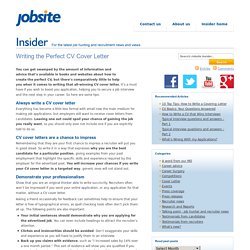
It’s a must have if you wish to boost you application, helping you to secure a job interview and the next step in your career. So here are some tips: Always write a CV cover letter Everything has become a little less formal with email now the main medium for making job applications, but employers still want to receive cover letters from candidates. Leaving one out could spoil your chance of gaining the job you really want, so you should only ever not include one if you are explicitly told to do so.
Covering letters. Covering letters Recruiters are busy people.
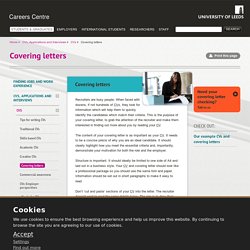
When faced with dozens, if not hundreds of CVs, they look for information which will help them to quickly identify the candidates which match their criteria. This is the purpose of your covering letter, to grab the attention of the recruiter and make them interested in finding out more about you by reading your CV. The content of your covering letter is as important as your CV.
It needs to be a concise précis of why you are an ideal candidate. Structure is important. Don’t ‘cut and paste’ sections of your CV into the letter. There are two main types of covering letter: one which accompanies an application for an advertised vacancy; the other for use when writing speculatively to employers which interest you. Checklist Covering letter for advertised roles: Start by stating clearly what role you are applying for and where and when you saw the advertisement. Cover letters. Top Ten Tips for writing cover letters - Careers Advice. Using a cinema analogy, if your CV is a big-budget blockbuster then your covering letter should be the short and enticing movie trailer.
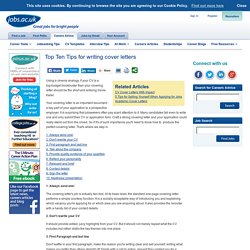
Your covering letter is an important document - a key part of your application to a prospective employer. It is surprising that jobseekers often pay scant attention to it. Many candidates fail even to write one and only submit their CV or application form. Craft a strong covering letter and your application could really stand out from the crowd. So if it's of such importance you'll need to know how to produce the perfect covering letter. 1. 1. The covering letter's job is actually two fold. 2. It should provide edited, juicy highlights from your CV. 3. Don't waffle in your first paragraph, make the reason you're writing clear and sell yourself; writing what makes you better than others straight off. 4.
Do some research into the company/ organisation and include information about them. 5. Or 6. Research - Analysed, clarified. 10 Top Tips: how to write a covering letter. Career coach Denise Taylor explains how to write covering letters in 10 easy stages.
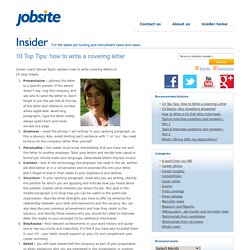
Presentation – address the letter to a specific person. If the advert doesn’t say, ring the company and ask who to send the letter to. Don’t forget to put the job title at the top of the letter and reference number where applicable. Avoid long paragraphs, type the letter neatly, always spell-check and never exceed one pageGrammar – avoid the phrase ‘I am writing’ in your opening paragraph, as this is obvious.
Also, avoid starting each sentence with ‘I’ or ‘my’. This information was taken from Denise’s best-selling book How to Get a Job in a Recession, which contains useful information on all aspects of job hunting. Related posts: Why are Cover Letters Important? Put simply – cover letters can set you apart from other candidates.
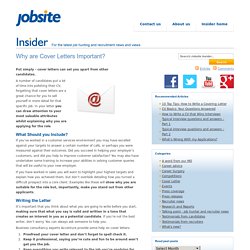
A number of candidates put a lot of time into polishing their CV, forgetting that cover letters are a great chance for you to sell yourself in more detail for that specific job. In your letter you can draw attention to your most saleable attributes whilst explaining why you are applying for the role. What Should you Include? If you’ve worked in a customer services environment you may have excelled against your targets to answer a certain number of calls, or perhaps you were measured against their outcomes. Did you succeed in helping your employer’s customers, and did you help to improve customer satisfaction? If you have worked in sales you will want to highlight your highest targets and explain how you achieved them, but don’t overlook detailing how you turned a difficult prospect into a core client. Writing the Letter Business consultancy experts Accenture provide some help on cover letters: Related posts:
CoverLetterTips VictorCheng. Badcoverletterexplained.